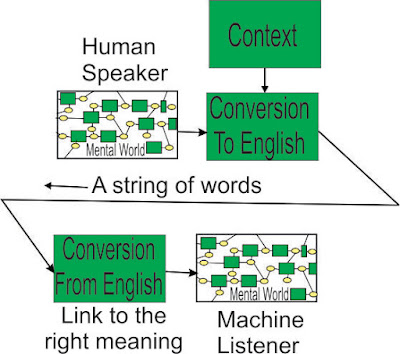Gary Marcus at the Royal Society
Gary does a good job of poking holes in LLMs, stressing
gullibility as the main reason LLMs took off.
Gary Marcus - My 25 minute talk
about this, delivered at the Royal Society on October 2, on the occasion of the
75th Anniversary of Turing Test can be found here.
Ard then talks about the benefits of NeuroSymbolics.
At the end of his talk, he shows a slide with suggestions
for the future, and a quote from Turing.
Suggestion 1:
“Many people think that a very abstract activity, like the
playing of chess, would be best.” - GM
This would be a very bad way to start. After a thousand years of single stepping, Catherine
the Great changed the rules of chess to make the queen the most powerful piece
on the board – no deep thoughts about strategy there. Machines can beat any human at chess, by the
simple process of playing millions of games and working out the best move at
any stage in any game. We should be hoping for new ideas, where the machine has
the wit to change the rules within the bounds of current reality. Chess is a
very bad foundation to build on, based as it is on our worst limitation – the Four
Pieces Limit. Looking after 16 chess pieces is a far cry from a military battle
which can flow over land, sea, air, space, cyber and psychological warfare.
Suggestion 2
“It can also be maintained that it is best to provide the
machine with ‘senses’, and then teach it to understand and speak English. This
process could follow the normal teaching of as child. Thins would be pointed
out and named, etc.” – GM
A child has an unconscious mind, which we don’t understand,
which is eager to learn. The machine doesn’t.
A quote from Turing: “We can only see a short distance
ahead, but we can see plenty there that needs to be done” – Computing Machinery
And Intelligence, 1950
The problem – Neurosymbolics is never going to get us to having
a machine understand English. The notion that we can stick two mutually exclusive
and crude things together, and end up with something (with all its quirks) that
smoothly integrates law, mathematics, physics, chemistry, genetics, psychology is
fanciful. “We could build specialist machines”. We could, but then we would end
up with the same poor collaboration we get from human experts – they may be
brilliant within the boundary of their specialty, and frighteningly bad on just
the other side of it.
There is a shortcut – we make English the language of AI.
This way, we show just how profoundly unwise (or snake-oilish) it was to base “AI”
on something that has no understanding of the meanings of words (it is fine for
a Search Engine, which might otherwise bring back a million hits). It would
start people on the long road to understanding what comes out of their mouths
courtesy of the Unconscious Mind, while we build a machine version of it.
What about things we don’t understand, like Quantum
Entanglement? We run out of answers very quickly on most things – six is pretty
typical. Is there another language that does a better job of explaining the
unexplainable – English (and a few formulae) will eventually get there.



Comments
Post a Comment